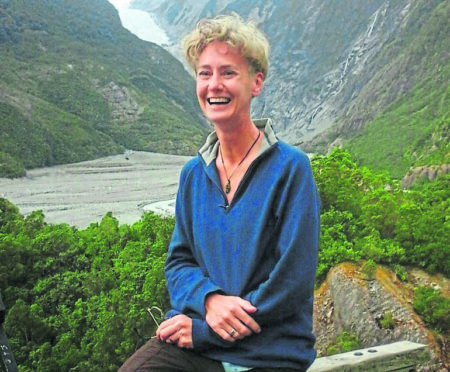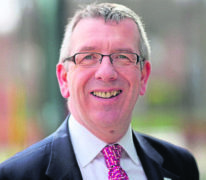Patients suffered “serious, irreversible and avoidable harm” because follow-up out-patient appointments were “deliberately” delayed to meet targets, a former NHS Highland neurologist has claimed.
Dr Bethany Jones, who resigned in 2013 over allegations of “managerial mismanagement”, has backed calls for an independent inquiry to be carried out after whistleblowers came forward alleging a “conduct of bullying and harassment” at the health authority.
Dr Jones, 50, who now works in New Zealand, told the Press and Journal: “Physicians were sidelined and ignored when highlighting patient safety concerns caused by a focus on target-driven medicine.
“Back in early 2011, during a hospital physician staff meeting, a specific group of consultants highlighted the risks of giving new patients sole priority over follow-up patients.
“Against their request patient follow up appointments were postponed by senior managers in order to meet targets.”
>> Keep up to date with the latest news with The P&J newsletter
She added: “The physicians had meticulously gone through their follow up lists and were clearly distraught to discover eight patients who had suffered serious, irreversible and avoidable harm due to the fact that their follow up appointments had been delayed.
“The response from the senior hospital management was that targets simply needed to be met and they closed the matter with no further discussion possible.”
Her criticism comes in response to four senior clinicians highlighting the “longstanding culture of bullying and harassment” by senior managers at NHS Highland.
Dr Jones said: “I would agree that this culture not only has had a detrimental effect on staff wellbeing but has also impacted on the quality of patient care.
“I fully support the call for an external, independent public enquiry into this matter.
“Like many of my colleagues I chose to resign from the NHS Highland as a direct consequence of the managerial mismanagement and would advise to include the many ex-staff members in any enquiry.”
She added: “Ongoing communication with my ex-colleagues over the years confirms matters have continued to deteriorate.
“It is truly heart breaking to see patients and highly dedicated staff suffer under such mismanagement.”
Gavin Smith, of the GMB union, said: “This is more evidence backing up the culture the whistleblowers have raised.
“There is a large number of staff coming forward with evidence of bullying and harassment.
“The only way for the situation to be resolved is for an independent external inquiry.”
Highlands and Islands Labour MSP and shadow health minister David Stewart said: “It’s very distressing to hear these claims, especially when it’s alleged that patients suffered due to missed follow-up checks.
“The more that is being revealed, the more backing there is for an independent inquiry by the Scottish Government – something I’ve called for from the beginning.
“Bullying and harassment have no place in the NHS and if it is proved that patients have suffered that’s a damning indictment of internal relations.”
An NHS Highland spokeswoman said: “The Board recognises the importance of timely review from a patient safety basis in some situations.
“Return outpatient performance is for that reason regularly reported to the Board Clinical Governance committee and the operational unit quality and patient safety committees.”
She added that the organisation “does not tolerate bullying and harassment behaviours”.
She added: “The board takes such allegations extremely seriously and any complaints made will be fully investigated through appropriate procedures.”
Organised disaster
Dr Bethany Jones started work in the Highlands in 2007 and left in 2013, claiming she resigned over “managerial mismanagement”.
She studied in the Netherlands, has a PhD and passed her physician exams with honours.
She was the first permanent neurologist in the Highlands, saying: “I was single handed for the first few years and I made some great progress in the neurology services.
“I was the first in the Highlands to do video link tele neurology clinics with Skye and Caithness.
“We – the multiple scleroris (MS) nurse and I – were the first to give the newest infusion drugs for MS in a public hospital in Scotland.
“I also set up a first-class one stop multidisciplinary memory clinic for young onset dementia patients, together with the psychiatrists, neuropsychologis and dementia nurse.”
She added: “I was not unique in my qualifications and achievements compared to other NHS Highland colleagues at the time. I think that is a very important point to make.
“Most of the Highland staff (all levels) were either local or chose to move there. The Highlands is a small community and there is a lot of loyalty from staff towards each other and the patients.
“There was a lot of pride in our achievements as well. That is perhaps one of the reasons why this [alleged “culture of bullying”] could go on so long. We always found that last bit of extra energy and effort to care for each other.”
Whistle blowing
More than 100 workers have come forward since whistleblowers alleged a “severe bullying culture” at NHS Highland.
The four Highland clinicians who spoke out are Eileen Anderson, consultant radiologist at Raigmore Hospital in Inverness; Lorien Cameron-Ross, out of hours GP at Raigmore; Jonathan Ball, a GP at Nairn Medical Practice; and Iain Kennedy, executive partner at Riverside, Foyers and Cromarty medical practices.
In an open letter, they wrote: “This practice of suppressing criticism, which emanates from the very top of the organisation has led to a culture of fear and intimidation.
“This has had a serious detrimental effect on staff at all levels of NHS Highland, but equally importantly has had an adverse effect on the quality of care we are able to provide.”
They, and the GMB union, have since repeated calls for an independent public inquiry.

